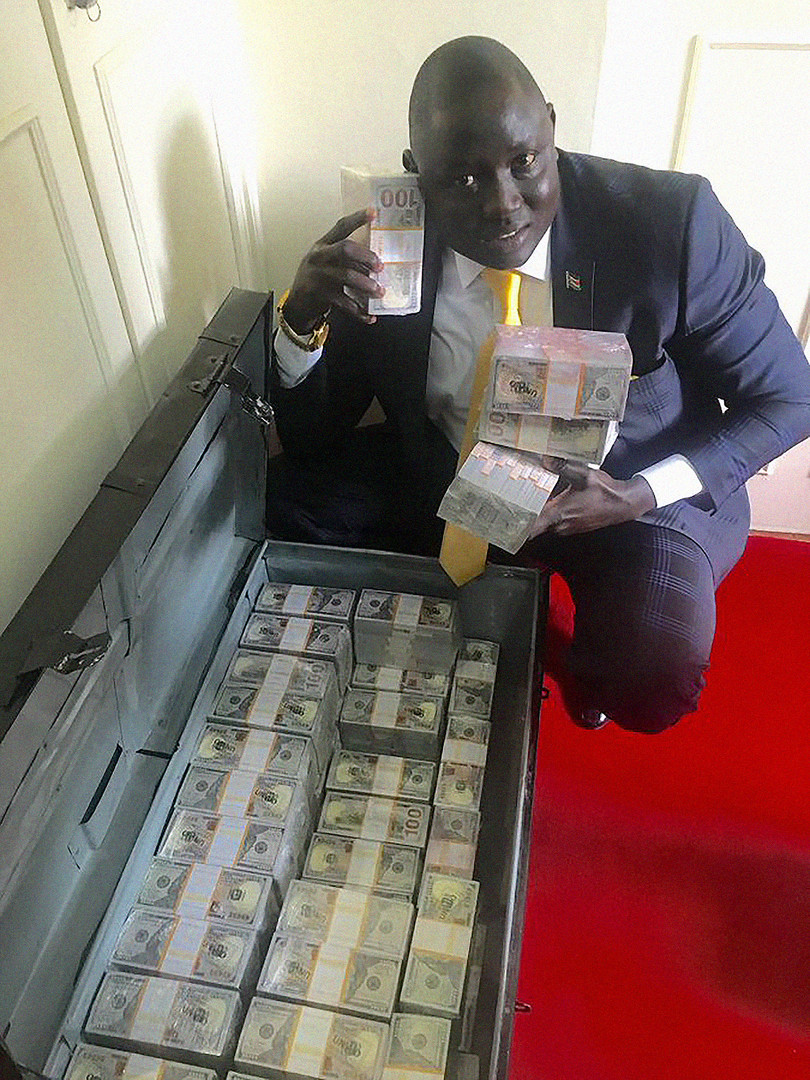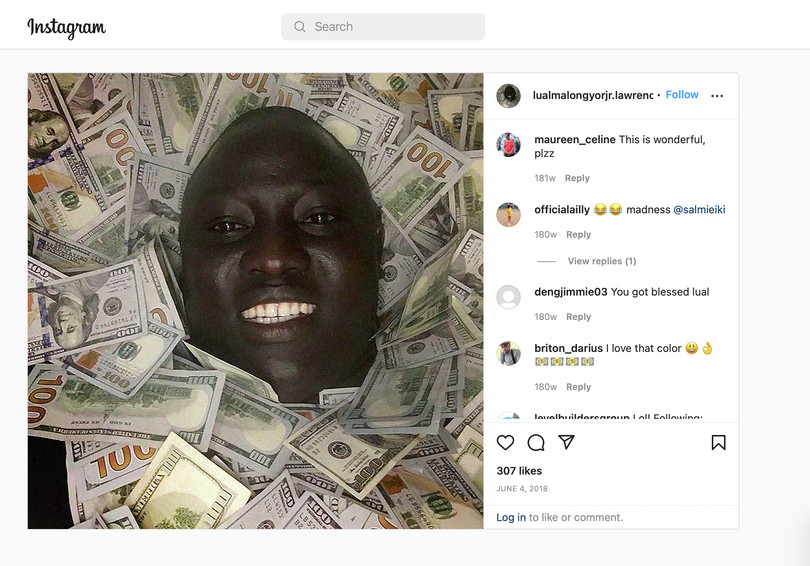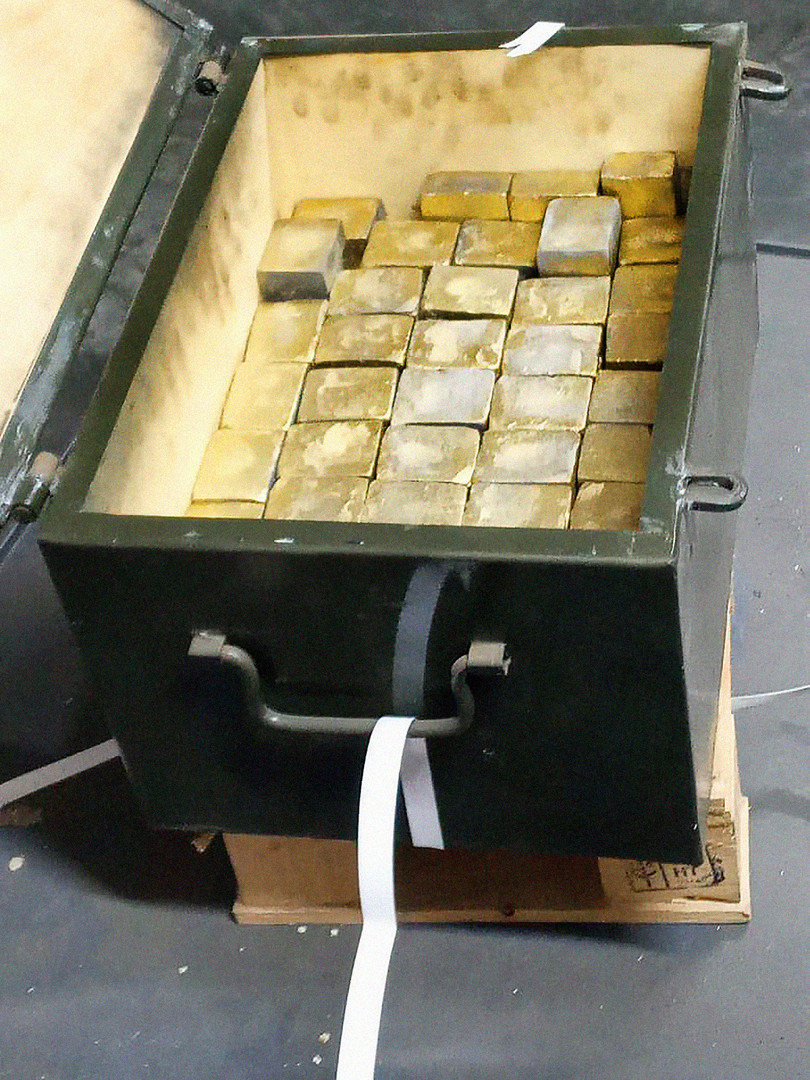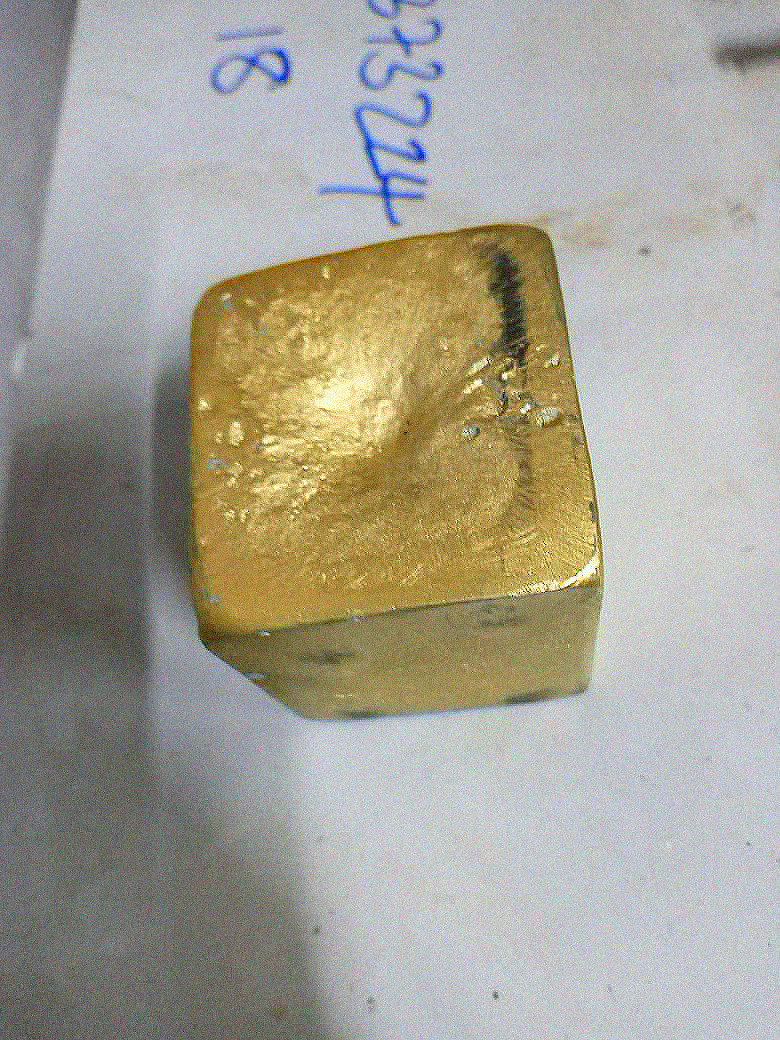What the proliferation of fake-gold scams tells us about regulation, corruption and criminality in East Africa’s gold market.
In July 2021, a Ugandan anti-corruption court found South Sudanese businessman Lual Lawrence Malong Yor guilty of defrauding an Ethiopian national of over US$1 million.1 Together with his associates, Malong – who had become notorious for posting videos of himself online lying on top of piles of dollars2 – had carried out an elaborate fake-gold scam, obtaining money and creating false documentation for consignments of gold that never materialized.3

Lual Lawrence Malong Yor, the South Sudanese businessman found guilty of conducting a million-dollar ‘gold scam’ by a Ugandan anti-corruption court in July 2021.
Photo: Twitter

Malong shows off his wealth to great acclaim on social media.
Photo: Instagram
The striking details of the story made headlines across East Africa.4 Yet, dramatic as it was (even the presiding judge described it as worthy of a movie), Malong’s case is by no means unique. Criminal networks with connections in the DRC and South Sudan play an increasingly active role in fake-gold scams in Nairobi and Kampala. These cases, which involve fraudsters promising investors gold but delivering imitations (such as brass) or simply disappearing with investors’ money, highlight the issues of corruption and poor regulation in East Africa’s gold sector that underlie this burgeoning criminal economy.
How gold scammers operate
Gold scammers in East Africa tend to target foreign investors (from as far away as Malaysia, India, Dubai, Ukraine, Korea and the UAE), offering them gold at very low prices.5: Prospective buyers are enticed with bars of genuine gold, gold-plated metals and nuggets, or even powder. However, according to CP Mwangi, chairperson of Kenya Chamber of Mines, ‘What people are buying on the streets is brass, which once cooked, looks like gold.’6 In one case from September 2021, a Guinean national operating from Nairobi defrauded an Indian national, agreeing to sell him 44.45 kilograms of gold at US$39.70 per gram (well below international market rates of the time) to be shipped from Guinea through Nairobi’s Jomo Kenyatta International Airport; instead, the dealer sent river pebbles.7
A review of major cases reported by law enforcement in Kenya and Uganda between the beginning of 2021 and the beginning of March 2022 shows that defrauded investors lost an estimated US$25 million in a total of 18 incidents.8 In one case from 2020, a DRC national, arraigned in a Nairobi court in January 2022, was accused of defrauding a Ukrainian of US$8.32 million in 2020,9 an amount equivalent to 136% of the value of Kenya’s total gold production.10
Many of the networks involved appear to be made up of foreign nationals. GI-TOC research indicates that, in the past year, Kenya has arrested seven foreigners (three Cameroonians, two Tanzanians, a Nigerian and a Zambian) in connection with the sale of fake gold, while Uganda arrested eight suspects (five Congolese, two Nigerians and a Cameroonian) in the first three months of 2021.11 Rivalry between gold-scamming networks and disputed deals have led to violence and assassinations.12
Figure 1 Reported gold scams in Kenya and Uganda from February 2021 to February 2022.
A problem of international proportions


A consignment of fake gold bars seized by police officers at Jomo Kenyatta airport in Nairobi in June 2021, which had been imported from Uganda.
Photos: Directorate of Criminal Investigations, Kenya
The international impact of the East African fake-gold business cannot be overstated. In 2019, Kenyan President Uhuru Kenyatta moved to defuse a diplomatic incident by meeting with the ruler of Dubai, Sheikh Mohammed bin Rashid Al Maktoum, associates of whom had been scammed by Kenyan nationals in a Ksh400 million (over US$3.5 million) deal involving the promise of 4.6 tonnes of gold that didn’t exist. The gold was allegedly to be sourced in the DRC and transported to the UAE through Jomo Kenyatta. Kenyan authorities indentified Senator Moses Wetangula, former foreign minister and now leader of one of the country’s key political parties, as a ‘key person of interest’ in this case.13 Wetangula dismissed the claims as a ‘non-issue’.14
Law enforcement authorities in Kenya and Uganda have appealed to prospective gold buyers to beware potential scammers.15 The head of Kenya’s Directorate of Criminal Investigations (DCI), George Kinoti, has urged embassies and high commissions around the world to advise their citizens of the issue: ‘The gold scam has now reached alarming levels as unsuspecting foreign nationals are being swindled out of large amounts of money by fraudsters,’ he declared in December 2021.16
The Malong case: A classic of the genre
The details of the elaborate scam Malong carried out includes many of the hallmarks typical of ‘fake gold’ deals. Malong first made an acquaintance with Abebe Engda, a friend of his eventual victim WG Dessie, both South Africa-based Ethiopian businessmen. Over six months from June 2017, he set up a series of meetings with the two men, at high-end hotels in Uganda and Nairobi, and in South Sudan and South Africa, facilitating all their travel visa requirements. As seen in other, similar scams, the intention with such high-end meetings is to expose to the potential victim that the perpetrator is wealthy and legitimately making substantial profits from the gold trade.
Malong offered to sell Dessie two tonnes of gold sourced in the DRC. Dessie had travelled to ‘Uganda, to Kenya, to Dubai, to Hong Kong SAR and back and forth several times chasing gold that never was,’ the court stated. By the time of his arrest, Malong had still not supplied the gold.17
Malong was aided by a network of people: one posed as an army general from the DRC (the owner of the fictitious gold), and others pretended to be representatives of the Uganda and Kenya revenue authorities and INTERPOL. Dessie was conned into paying money to these individuals to facilitate the deal.
Dessie and his associate ‘trusted [Malong] as a man of God’, thinking that his religious principles made him a trustworthy business partner. They had also ‘put so much money in the deal that they feared to pull out believing it was due to mature. Pulling out would lead to loss,’ said Judge Lawrence Gidudu in the ruling.18
The reality of Malong’s background is difficult to decipher. While he has claimed to be related to South Sudan’s former army chief of staff Paul Malong Awan,19 including through his public LinkedIn profile, the nature of their relationship is unclear.20 Both Paul and Lawrence Malong have also at other points denied any familial relationship.21 Paul Malong Awan has been subject to sanctions by both the UN and the US government for his role in South Sudan’s conflict and a series of corruption allegations.22
Reporting from investigative organization The Sentry published in 2020 describes Malong as a ‘politically exposed person’ in South Sudan who holds, respectively, stakes of 10% and 17% in gold-dealing companies JPL Gold & Diamond and Gold Stone Mining. These companies are reportedly among several South Sudan-registered gold companies with ties to politically exposed persons.23
Hadley Becha, director of CANCO, a Kenyan non- governmental organization that deals in environmental governance and matters to do with the extractive industry, told the GI-TOC that it is common for gold scammers to pose as the relatives of top politicians and officials from the country in which the ‘investment’ would happen, usually South Sudan or the DRC.24
Malong’s network falsified a litany of documents required for gold-export transactions – among them, export permits purportedly issued by the Commissioner of the Directorate of Geological Survey and Mines in Entebbe; freight and cargo company receipts; an analytical lab report from the National Chamber of Commerce and Industry; and a bill for air freight. False documentation is an essential part of many gold scams in convincing the investor of the legitimacy of their gold supply.
A regional gold market vulnerable to criminality and fraud
According to an official in Kenya’s Chamber of Mines, corruption in state institutions charged with controlling the mining sector and managing large-scale informal gold supplies has made the region’s gold sector attractive both to investors eager to circumvent regulations to buy cheap gold and to scammers looking to prey on these investors.25
Becha made a similar assessment: ‘There’s a belief that you can get cheap gold from the eastern Africa region, and that’s why international merchants of the commodity run here. They believe that this place is very corrupt and that it lacks laws and regulations to govern the business.’26 Ironically, it seems that for some investors the dubious desire to make a profit on a low-price, low-regulation market is what puts them at risk of being scammed.
Uganda and Kenya’s immediate neighbours, the DRC and South Sudan, are major gold producers. Yet the informal nature of their gold industries has made them magnets to criminal actors ready to use corruption, financial leverage and violence to turn a profit.27 Fraudsters are also conscious of the fact that international investors perceive gold from the DRC and South Sudan to be cheap and easily accessible.28
Kenya and Uganda play complementary roles in the scams. Whereas Kampala acts as an operations base for criminal networks, Nairobi – as the major regional communications and financial hub – is the centre of the financial transactions in these scams. According to Kenyan security expert George Musamali, ‘The fraudsters come from as far as South Africa, the DRC and South Sudan to work with Kenyan fixers, because the country provides an ideal climate for their handiwork.’29 A Kampala-based gold dealer revealed that ‘Kampala is like a fieldwork area; real deals are hatched from Nairobi, then done in Kampala.’30
The role of corruption
In Kenya, a leadership figure in a key political party, a former cabinet secretary, and three MPs representing constituencies in Nairobi are alleged to be major figures in the fake-gold industry. These individuals are currently being investigated for colluding with foreigners to
defraud international investors, according to a source at the DCI.31 In March 2021, Kenya’s DCI recovered fake gold and US$283 million in fake currency, all linked to a former a cabinet secretary. The case is yet to be prosecuted.32
‘In Kenya, the correlation between crime and politics remains watertight. Most of the big scandals are driven by or facilitated by top politicians and bureaucrats who remain untouchable because the state doesn’t want to go for them out of fear that the political scales will tilt against it,’ said a senior official in the Office of the Director of Public Prosecutions, Nairobi.33
In Uganda, some of the major players in fake-gold scams are alleged to be members of the police and military.34 In a notable case, police questioned the Deputy Director of Internal Security Idi Taban Amin (son of former president Idi Amin) in March 2021 in connection with a gold scam where a US national lost over US$8 million.35
Legitimate co-conspirators
Defrauders such as Malong would have difficulty pulling off such elaborate schemes without the aid of transnational conspirators and corrupt lawyers, immigration personnel and law-enforcement officers strategically placed in Nairobi and Kampala. One gold dealer speaking to the GI-TOC in Kampala described a system in which some corrupt gold dealers will ensure there is an issue with an international buyer’s paperwork so that border authorities have a pretext for seizing the gold or the opportunity to exchange it for false gold during inspection.36 Kenya’s DCI has publicly stated that ‘the multi-million shilling conspiracy is executed with the assistance of various agencies, including some government institutions’.37
Legal firms have also featured prominently in gold scams, accused of facilitating criminality by registering dud companies on behalf of the scammers or facilitating bank transactions. A lawyer for the anti-corruption court based in Kampala argued that legal professionals may also be ‘aiding criminality’ by lending legitimacy to the fraudulent deals.38
An unwelcome reputation
Prolific fake-gold scams pose a problem to the smooth operations of gold regulatory bodies and discourage genuine investors. ‘The international dimension to the fraud is giving Kenya a negative and unwelcome reputation in the world of minerals and mining,’ said then-mining minister Dan Kazungu in 2020.39
While Ugandan and Kenyan police have emphasized the need for prospective buyers to exercise due diligence and engage the relevant regulatory bodies before transacting businesses, the involvement of officials in many of these scams makes identifying a reliable authority more difficult, meaning buyers are left guessing when trying to distinguish a fake gold deal from the real thing.
Notes
-
Judge Lawrence Gidudu, Malong Ruling, High Court of Uganda, Criminal Session Case 4 of 2019. ↩
-
For example, see Ben - LIVE, South Sudan Controversial tycoon Lawrence Lual Malong squeezed in Ugandan Court over Fake Gold, YouTube, 4 April 2019, https://www.youtube.com/watch?v=Ai63p_TM4vc. Similar posts were made on Malong’s Instagram page. ↩
-
Judge Lawrence Gidudu, Malong Ruling, High Court of Uganda, Criminal Session Case 4 of 2019. ↩
-
Vincent Achuka, How Uganda brought down South Sudanese fake gold fraudster Lual Malong, Daily Nation, 19 August 2021, https://www.msn.com/en-xl/africa/other/how-uganda-brought-down-south-sudanese-fake-gold-fraudster-lual-malong/ar-AANusq0. ↩
-
Interview with a gold dealer, Eastleigh, Nairobi, 17 January 2022. ↩
-
Morris Kiruga, High-profile gold scam hurts Kenya’s UAE ties and highlights wider legal problems, The Africa Report, 17 May 2019, https://www.theafricareport.com/13085/high-profile-gold-scam-hurts-kenyas-uae-ties-and-highlights-wider-legal-problems. ↩
-
Jackson Otukho, Kenyan Man Arrested with Box of Stones Ready to Export It as Gold Worth KSh 200m, Tuko, 15 September 2021, https://www.tuko.co.ke/426280-kenyan-man-arrested-box-stones-ready-export-it-gold-worth-ksh-200m.html. ↩
-
Based on information gathered from Kenya DCI Twitter account and media reports – see Figure 1. ↩
-
Carolyne Kubwa, Congolese detained over Sh940m fake gold deal, The Star, 7 January 2022, https://www.the-star.co.ke/news/2022-01-07-congolese-detained-over-sh940m-fake-gold-deal. ↩
-
Kenya National Bureau of Statistics, Economic Survey 2021, https://www.knbs.or.ke/wp-content/uploads/2021/09/Economic-Survey-2021.pdf. ↩
-
Based on information gathered from Kenya DCI Twitter account and media reports – see Figure 1; Uganda Radio Network, Eight arrested in Munyonyo over counterfeit currency, fake gold, The Independent, 25 February 2021, https://www.independent.co.ug/eight-arrested-in-munyonyo-over-counterfeit-currency-fake-gold. ↩
-
Cyrus Ombati, Man killed in his Kilimani house in ‘fake gold deal’ gone sour, The Standard, 22 August 2020 https://www.standardmedia.co.ke/nairobi/article/2001383487/man-shot-dead-in-his-house-in-fake-gold-deal-gone-wrong. ↩
-
Cyrus Ombati, Uhuru and Raila met Dubai royal ruler over fake gold export saga, The Standard, 20 May 2019, https://www.standardmedia.co.ke/nairobi/article/2001326285/uhuru-raila-met-dubai-sheikh-over-fake-gold-saga; Business Daily, DCI says to grill Wetang’ula over Saudi gold scam, 16 May 2019, https://www.businessdailyafrica.com/economy/DCI-says-to-grill-Wetang-ula-over-Saudi-gold-scam/3946234-5119108-hrs1isz/index.html. ↩
-
Geoffrey Mosoku, Wetangula speaks on fake gold saga, The Standard, 30 May 2019, https://www.standardmedia.co.ke/kenya/article/2001327735/wetangula-speaks-on-fake-gold-saga. ↩
-
In Uganda, police spokesman Fred Enanga made the following statement: ‘We would like to appeal to all prospective buyers in the gold industry, to purchase gold from authorized dealers, with the valid trading licence to conduct business. They can also seek guidance from the Ministry of Trade And Industry, the Department of Mines and Geological Surveys, The Uganda Investment Authority and the Police Minerals Enforcement Unit, before transacting in any minerals. This will save them from the financial and legal consequences they face out of fake mineral scams’. See Wilfred Kamusiime, Police warns public about fake gold cams, Uganda Police Force, 12 August 2019, https://www.upf.go.ug/police-warns-public-about-fake-gold-scams. ↩
-
Cyrus Ombati, Five arrested for defrauding Korean of Sh2.9m in fake gold scam in Nairobi, The Star, 8 December 2021. https://www.the-star.co.ke/news/2021-12-08-five-arrested-for-defrauding-korean-of-sh29m-in-fake-gold-scam-in-nairobi. ↩
-
Judge Lawrence Gidudu, Malong Ruling, High Court of Uganda, Criminal Session Case 4 of 2019. ↩
-
Ibid. ↩
-
Carmel Rickard, Uganda’s anti-corruption court sentences international gold scammers, African Legal Information Institute, 9 September 2021, https://africanlii.org/article/20210909/uganda’s-anti-corruption-court-sentences-international-gold-scammers. ↩
-
The Sentry, Untapped and Unprepared: Dirty Deals Threaten South Sudan’s Mining Sector, April 2020, https://thesentry.org/reports/untapped-unprepared. ↩
-
Sudan Tribune, Malong denies accusations of corruption and war crimes in South Sudan, 15 October 2018, https://sudantribune.com/article64570. ↩
-
UN Security Council, Paul Malong Awan, 13 July 2018, https://www.un.org/securitycouncil/content/paul-malong-awan; US Department of the Treasury, Treasury Targets South Sudanese Government Officials and Related Companies for Continued Destabilization, 6 September 2017, https://www.treasury.gov/press-center/press-releases/Pages/sm0152.aspx. The US Treasury Department also lists a series of corruption allegations against Malong, saying that ‘after his dismissal [from office] and flight from Juba, Malong was stopped outside of Juba in early May 2017 and reportedly found with currency worth millions of U.S. dollars in his possession that he had allegedly stolen from the SPLA treasury. In 2014, under Malong, the Ministry of Defense procured loans of billions of dollars from South Sudanese oil companies in order to acquire military equipment. However, as of later that year, no actual military purchases using these funds had been made.’ ↩
-
The Sentry, Untapped and Unprepared: Dirty Deals Threaten South Sudan’s Mining Sector, April 2020, https://thesentry.org/reports/untapped-unprepared. ↩
-
Interview with CANCO director Hadley Becha, Nairobi, 14 January 2022. ↩
-
Interview with official of the Kenya Chamber of Mines, Nairobi, 3 February 2022. ↩
-
Interview with Community Action for Nature Conservation (CANCO) director Hadley Becha, Nairobi, 13 January 2022. ↩
-
Marcena Hunter et al., Illicit gold markets in East and Southern Africa, GI-TOC, May 2021, https://globalinitiative.net/analysis/illicit-gold-east-southern-africa. ↩
-
Interview with Ugandan gold dealer Alex Andega, Koboko Town, Uganda, 28 November 2021. ↩
-
Interview with security expert George Musamali, Nairobi, 11 January 2022. ↩
-
Interview gold dealer, Kampala, 6 December 2021. ↩
-
Interview with source in the DCI, 16 January 2022, by phone. ↩
-
Interview with senior Office of the Director of Public Prosecutions official, Nairobi, 3 February 2022. ↩
-
Ibid. ↩
-
Interview with New Vision journalist, by phone, 7 December 2021. ↩
-
NTV News, Police quiz Taban Amin over gold scam, YouTube, 12 March 2021, https://www.youtube.com/watch?v=uzJAOwKqTE4. ↩
-
Interview with gold dealer, Kampala, 6 December 2021. ↩
-
DCI Kenya, Twitter, 27 June 2021, https://twitter.com/DCI_Kenya/status/1409047051346788353. ↩
-
Interview with anti-corruption court lawyer, Kampala, 9 December 2021. ↩
-
Daily Nation, Government warns of fraudsters in fake gold scam, 27 September 2017, https://nation.africa/kenya/business/govt-warns-of-fraudsters-in-fake-gold-scam-455978?view=htmlamp. ↩
